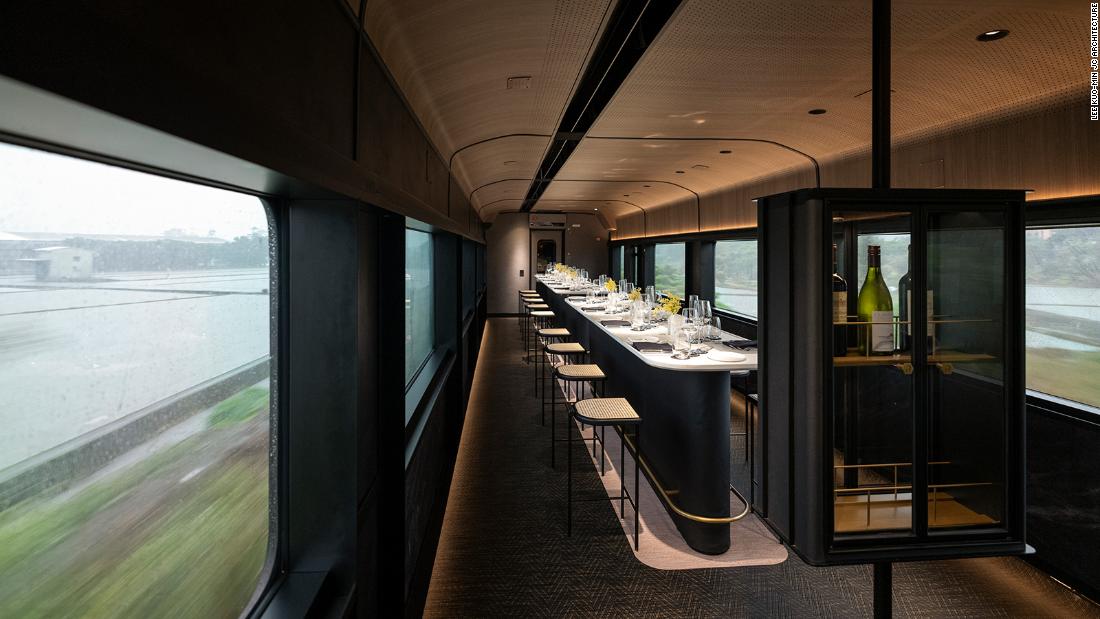Editor’s Note — Monthly Ticket is a new CNN Travel series that spotlights some of the most fascinating topics in the travel world. In May, we’re riding the rails as we explore the world’s greatest train journeys. Whether you’re looking for travel inspiration or insider knowledge, Monthly Ticket will take you there.
(CNN) — Taiwan’s first-ever gourmet dining train has just hit the tracks — and this stunning creation is earning fast fans not just for its food, but for its appearance, too.
The unveiling of the Moving Kitchen took place at Taipei’s Nangang train station platform in March 2022 — a surreal moment for Johnny Chiu, founder of Taipei-based J.C. Architecture.
Looking at the chic orange and black train, it’s difficult to believe that when it first debuted in 2019, its original appearance was referred to as an “aesthetic catastrophe” by local media.
Chiu redesigned the entire train, including the new gourmet dining cars, and is the main reason this former “catastrophe” is now affectionately referred to as “most beautiful train in Taiwan.”
The letter that started it all
“In Taiwan, train travel has always been a big part of our life,” Chiu tells CNN Travel.
“From on the way to joining the army (military service is compulsory for men in Taiwan) to going home for the Lunar New Year celebration, to meeting our girlfriends or grandmothers, train travel is in everyone’s memories.”
“The kitchen bar almost felt like a hospital, with plastic white countertops and rubbish bins you could find on the streets. And with the loud flowers painted on the wall — it really wasn’t tasteful. Everyone went nuts. The photos were on every media site and every social media account,” recalls Chiu.
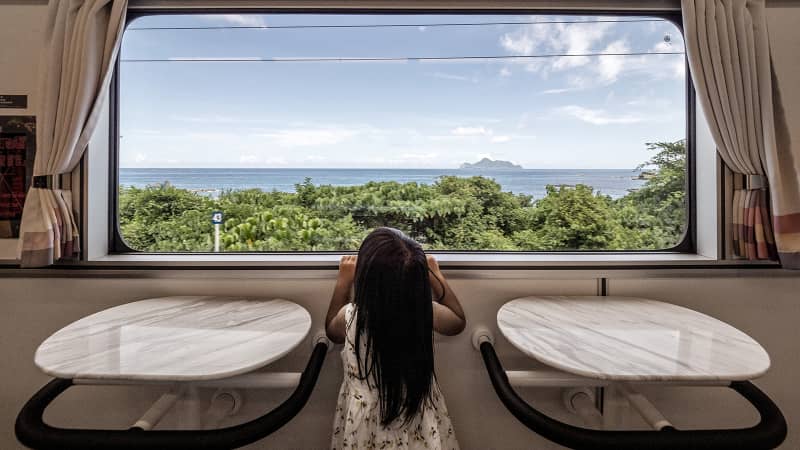
Designed by Johnny Chiu, the Moving Kitchen made its debut in March 2022.
Lee Kuo-Min JC Architecture
Sad about the situation, Chiu wrote an open letter, inviting everyone to see this as an opportunity for Taiwan’s railway to modernize, and hoped that someone would pass his message to the TRA.
In response to the criticisms, the TRA enlisted a group of creatives to find a more eye-pleasing solution. One of them saw Chiu’s open letter and reached out to him.
“I got an email reply saying, ‘Johnny, great. We’re happy you have this positive response. I’ll give you guys two weeks and please present to us your ideas,'” recalls Chiu.
Two weeks of sleepless nights and whiskey-infused brainstorming sessions later, Chiu and his team presented the TRA with a plan for the makeover. Soon after, they were awarded the project.
Making over a 50-year-old train
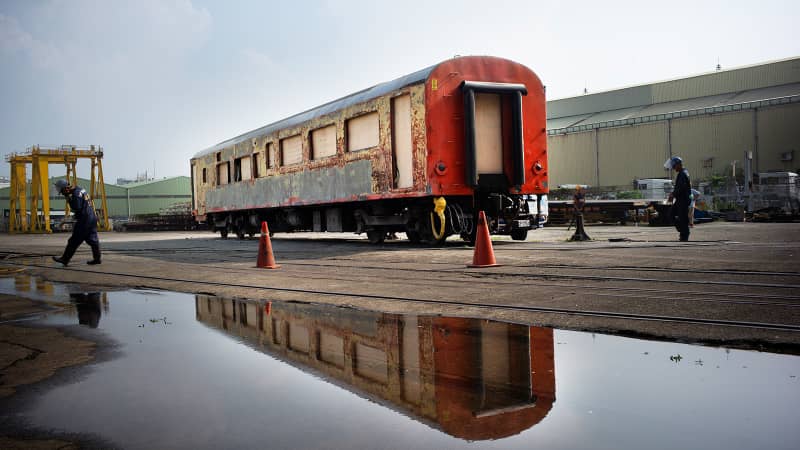
Architect Johnny Chiu and his team were tasked with transforming this 50-year-old train in 2019.
Lee Kuo-Min JC Architecture
But the real challenge had just began.
The team only had seven months to remodel the refurbished orange train. Once known as the Chu-Kuang Express, it was an old diesel locomotive from the 1970s.
“We didn’t know it was an old train. We had to gut everything inside and repaint the whole thing,” says Chiu.
They faced many challenges, including power and structural issues.
There were complicated electrical wires they needed to hide. Meanwhile, safety standards were higher than for their usual interior projects as train materials have to be flame-retardant and durable.
Hardware aside, it was also difficult to persuade a 132-year-old governmental organization to get on board with these new design ideas.
“The Taiwan Railway doesn’t represent design — it represents safety, punctuality and accuracy. But luckily, the TRA director and the vice director were able to make the hard decisions and push the whole team with dedication and passion,” says Chiu.
The new design came together in seven months — and it was introduced to the public again at the end of 2019.The historic orange color remains, but is enhanced by black to create a luxurious look.
The team replicated the original retro Japanese-style font on the car livery.
The interior takes inspiration from Taiwan’s natural environment, with wooden textures and black stones used to echo the mountains and rock formations along the shores of Taiwan — where the train will cruise along.
“We even thought about the way you get the ticket. Like in Willy Wonka’s Chocolate Factory, you open an envelope to find a golden ticket and you are happily anticipating your ride,” says Chiu.
The Future 2.0: The first gourmet train in Taiwan
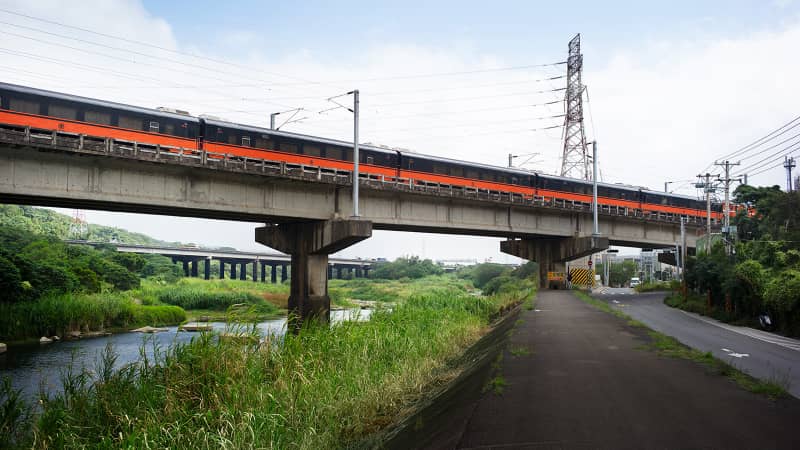
The livery of The Future was inspired by the original train’s orange color.
Lee Kuo-Min JC Architecture
With a major win under its belt, the TRA proceeded with the production of The Future 2.0 — the Moving Kitchen gourmet train.
Victor Cheng is the senior director of Lion Travel, which handles booking for the train.
“Gourmet trains have been a familiar concept in Japan and Europe but not Taiwan,” he tells CNN Travel. “But Taiwanese love trains and they love food — so it was a logical and attractive step to combine the two.”
Being The Future’s sole travel operator and the largest travel agency in Taiwan, Lion Travel spent more than a year curating the experience with J.C. Architecture and TRA before it was unveiled in March.
“To be the first five-star gourmet train in Taiwan, there were some hurdles we had to overcome — the lack of cooking water and electricity are the first two major difficulties,” says Cheng.
A large amount of water is needed for drinking, cleaning and cooking. But there is limited storage space on board.
To solve the problem, freshwater and utensils are loaded onto the train in between meals at stops. Staff also work closely with the partnering caterer, Silks Hotel Group, which operates luxury hotels and restaurants in Taiwan, to arrange the appliances needed on board.
“The second challenge is to offer fine-dining restaurant services on a moving train. Our servers spent a long time practicing to have a firm stance while waiting tables on a wobbling train. The timing of each dish also needs to be on point,” says Cheng.
The delivery of each course coincides with the views passengers will be seeing.
For example, the first course of one of the meals on the two-day journey is abalone. It’s presented when the train arrives at Turtle Island, which is famous for the mollusk.
The second course is a seafood salad on a blue dish, paired with the sea views of the eastern shore.
Then, the meal continues to showcase local specialties such as hot spring vegetables (vegetables that are grown with local hot spring water), duck and sweet purple potatoes while passing through different destinations.
“And because it is a travel train, we don’t have a schedule to rush from one station to another station. We can slow down the train during some of the most scenic routes. The train would stop while passengers dine at the most beautiful stretch of the route — where the train is closest to the sea in Hualien,” says Cheng.
A culinary journey
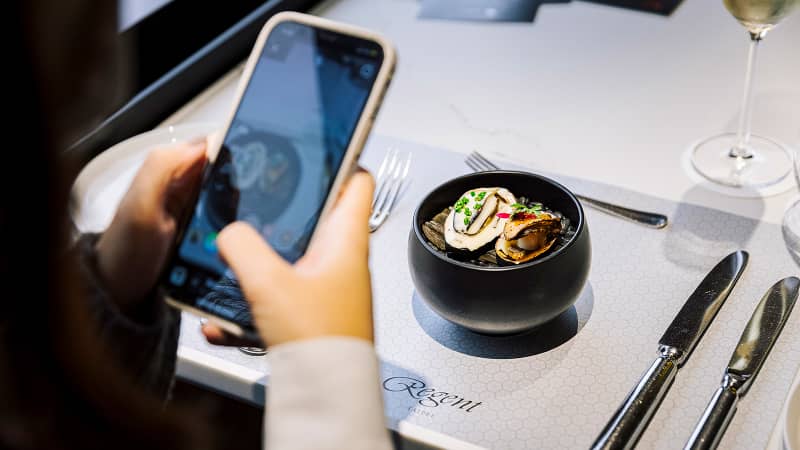
The Moving Kitchen is the first gourmet train in Taiwan.
Lion Travel
Cheng says every party involved in the project has done their best to ensure the smooth running of the Moving Kitchen.
“At the station where we stop our train, there was overgrowth that blocked parts of the sea views. Knowing this, TRA sent someone to pluck weeds and prune trees for the journey,” says Cheng.
The train journey serves more than culinary experiences. It’s combined with in-depth sightseeing activities like visiting a local rice farm and a fish port to understand the food they will be eating on the train.
“So it isn’t just having a good meal on a moving train. The Moving Kitchen combines food, scenery and sightseeing as an all-rounded journey,” adds Cheng.
Unlike the first version of The Future, the renovation of the Moving Kitchen cars took about a year, allowing more time for customization.
There are two new dining cars with 54 seats, as well as a new bar and a new kitchen. The dining rooms feature a mix of high bar counters, sofa booths and also two to four-seat tables.
“We pushed the materials a bit more. We bring in marbles from the Hualien County and rattan made by aboriginal tribes in the south of Taiwan,” says Chiu.
“I’m also from the south of Taiwan. I remember sitting in my grandmother’s rattan chair when I was a child as she spoiled me with her cooking.”
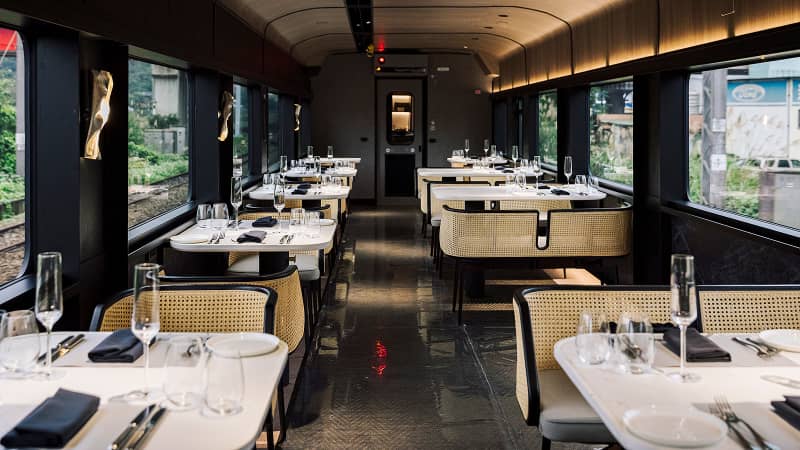
The chairs feature rattan from the south of Taiwan.
Lion Travel
It inspired Chiu to designed a special rattan chair for the Moving Kitchen. The chairs can be fixed to the floor for safety but are designed to feel light.
The armrest has a 45-degree angle, allowing passengers to squeeze into their seats easily but “still have an armrest chair that exists in a really fine dining restaurant” — which JC Architecture has had plenty of experience designing.
Special spotlights were designed to make the food look delicious and Instagram-friendly. A phone and menu stand is installed next to the table. A sculptable wall lamp allows passengers to manipulate the shape of the thin foil lamp shade.
Sold-out till September
Lion Travel’s Cheng tells CNN Travel that the response has been extremely positive. The gourmet train launched on March 30 and tickets for the Moving Kitchen journeys have been sold out till September.
“On the first journey, we had a dress code of orange and black — to go with the train’s colors. We see so many people who dress up for the occasion and they couldn’t stop taking photos once they were on the train. We were all so moved,” says Cheng.
Moving Kitchen currently offers one or two-day itineraries. During the latter, guests depart the train and spend one night in a nearby hotel. Six tours depart each month.
Six more train tours on The Future — without the Moving Kitchen — are also available each month. They are seasonally themed and range from one to four days. The Future train has four business class cars, each with 33 seats.
“I’m very proud of this train. It’s because I think it’s uniquely Taiwan. I think it is successful because the train gives confidence to this 132-year-old company. And there is a saying that, if TRA could do it, the other members of the public sector could, too,” says Chiu.
“I also think there is a lot more history and culture, which we could dig out and express in a new storyline. So I’m really happy that this one letter changed the public sector.”
